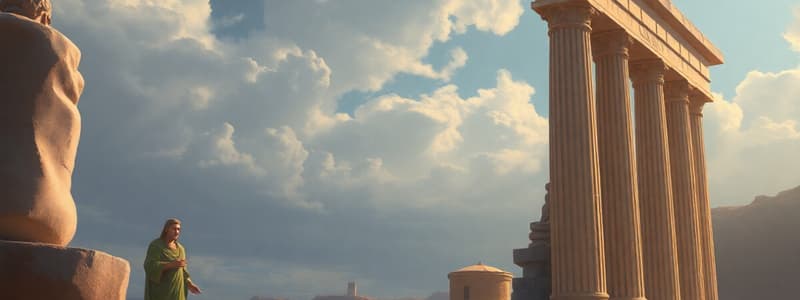Podcast
Questions and Answers
What major event marked the end of the Hellenistic period?
What major event marked the end of the Hellenistic period?
- The annexation of Ptolemaic Egypt by the Roman Republic (correct)
- The death of Alexander the Great
- The beginning of the Greco-Persian Wars
- The unification of Greece by Macedon
Which period directly preceded the age of Classical Greece?
Which period directly preceded the age of Classical Greece?
- Archaic period (correct)
- Byzantine period
- Greek Dark Ages
- Hellenistic period
Which city-state experienced a cultural peak during the Golden Age of Athens?
Which city-state experienced a cultural peak during the Golden Age of Athens?
- Thebes
- Athens (correct)
- Corinth
- Sparta
What characterized the civilization of Ancient Greece during the Greek Dark Ages?
What characterized the civilization of Ancient Greece during the Greek Dark Ages?
What was a significant impact of Classical Greek culture on later civilizations?
What was a significant impact of Classical Greek culture on later civilizations?
During which century did Greek urban poleis begin to form?
During which century did Greek urban poleis begin to form?
Which Macedonian ruler unified Greece?
Which Macedonian ruler unified Greece?
The Peloponnesian War was primarily fought between which two city-states?
The Peloponnesian War was primarily fought between which two city-states?
What is considered the legacy of Classical Greece in relation to Western civilization?
What is considered the legacy of Classical Greece in relation to Western civilization?
Flashcards
Archaic Period
Archaic Period
A period in ancient Greece marked by the rise of city-states, colonization, and the development of art, literature, and philosophy.
Greek Polis
Greek Polis
A collection of independent city-states in ancient Greece, each with its own government, laws, and culture.
Classical Greece
Classical Greece
A major period in ancient Greek history known for its advancements in art, literature, philosophy, and democracy.
Peloponnesian War
Peloponnesian War
Signup and view all the flashcards
Hellenistic Period
Hellenistic Period
Signup and view all the flashcards
Hellenization
Hellenization
Signup and view all the flashcards
Greek Dark Ages
Greek Dark Ages
Signup and view all the flashcards
Hellenic
Hellenic
Signup and view all the flashcards
Kingdom of Macedon
Kingdom of Macedon
Signup and view all the flashcards
Early Middle Ages
Early Middle Ages
Signup and view all the flashcards
Study Notes
Ancient Greek Civilization
- Ancient Greece spanned from the Greek Dark Ages (12th-9th centuries BC) to classical antiquity's end (c. 600 AD).
- It encompassed diverse city-states and territories.
- Before Roman rule, most were unified under Macedon (338-323 BC).
Periods of Ancient Greece
- Archaic Period (8th century BC): Formation of Greek city-states (poleis) and Mediterranean colonization.
- Classical Greece: Extended from the Greco-Persian Wars to Alexander the Great's death (323 BC).
- Included the Golden Age of Athens and the Peloponnesian War.
- Hellenistic Period: Spread of Hellenistic civilization through the Middle East, following Macedonian unification and Alexander's conquests. Ended in 30 BC with Ptolemaic Egypt's annexation by the Roman Republic.
Influence and Legacy
- Classical Greek culture significantly influenced ancient Rome.
- Roman expansion disseminated Greek culture throughout the Mediterranean and much of Europe.
- Greece is considered the cradle of Western civilization, impacting Western politics, philosophy, science, and art.
Studying That Suits You
Use AI to generate personalized quizzes and flashcards to suit your learning preferences.




